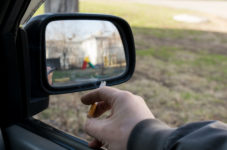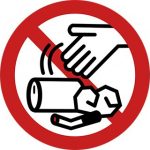Butt Tossers Face Heavy Fines and Demerit Points

In the wake of devastating bush fires across New South Wales, and a countryside that’s in the midst of drought, the state government has introduced tough new penalties for anyone who tosses a cigarette butt from a car window.
New penalties in 2020
Throwing a cigarette butt out a car window will cost a driver five demerit points. This will double to 10 demerit points if there is a total fire ban in place, and a fine of up to $11,000 will also apply in that case.
And penalties don’t just apply to drivers. Passengers caught tossing a lit cigarette on or near the roadway will be hit with a $660 fine, which doubles during total fire bans.
What is a total fire ban?
Total fire bans are declared when the risk of a fire spreading is the greatest.
During a total fire ban, you cannot light, maintain or use a fire in the open, or carry out any activity in the open that causes, or is likely to cause, a fire.
You are also prohibited from undertaking hot works out in the open, including welding, grinding or gas cutting or any activity that produces a spark or flame.
When will the new penalties come into effect?
The new penalties are expected to come into force on 17 January 2020.
It’s the first time a demerit point penalty has been imposed for this type of offence, but as the state battles with dry hot conditions and bushfires that have devastated the landscape taking with them lives and homes, police and emergency services are under no illusion about the damage that lit cigarette butts can cause.
Lives and land lost
Almost three million acres of countryside have been burned to the ground in our state this fire season. More than 700 homes have been destroyed and several lives lost, including two rural firefighters, both fathers, who have left behind wives and small children.
Minister for Police and Emergency Services, David Elliott, called tossing cigarette butts ‘criminal foolishness’, pointing out that more than 200 people had been caught carelessly tossing a lit cigarette in 2019.
The crime of arson
The strict new penalties bring this offence in line with the penalties in New South Wales for causing a fire. Tougher penalties for offences related to arson were introduced in 2018.
That year, the New South Wales parliament passed laws to increase the penalties for bushfire arson offences from 14 years to 21 years.
There are four distinct offences within the Crimes Act 1900 (NSW) which deal with the destruction of property by means of fire. These offences are contained in sections 195, 196, 197 and 203E of the Act.
Estimates from the National Centre for Research in Bushfire and Arson suggest that of the 60,000 bushfires that occur each year in Australia, about 13% are started deliberately, and 37% have ‘suspicious’ origins.
The NSW Rural Fire Service Association has welcomed the new penalties for cigarette butt tossing, and if you see someone who has thrown a lit cigarette out of a car window, you’re encouraged to report it, by calling the NSW Rural Fire Service hotline on 1800 679 737.
The offence of littering
The general offence of littering is outlined under section 145 of the Protection of the Environment Operations Act 1997 (NSW). this offence applies when a person deposits litter in or on a public place or an open private place. Litter includes cigarettes and cigarette butts.
A ‘public place’ is defined as a place that is open to the public, or is used by the public, whether or not on payment of money or other consideration, whether or not the place is ordinarily so open or used, and whether or not the public to whom the place is so open, or by whom the place is so used, consists only of a limited class of persons.
This offence carries a potential penalty of a $250 on the spot fit or a fine of $2,200 at the time of writing if the matter goes to court.
Subsection 145(3) of the Act makes clear that a person is not guilty if the litter was:
- placed in a receptacle provided by the custodian of the place for the depositing of litter, and
- in accordance with any conditions specified by the custodian, by means of a notice displayed on or in the vicinity of the receptacle, in relation to the depositing of litter in the receptacle, or
- placed a receptacle containing the litter in the place for the purpose of the litter being removed in the course of a litter removal service provided by the custodian of the place, or
- deposited the litter in the place:
- in response to an invitation contained in a notice published by the custodian of the place, and
- in accordance with any conditions specified in the notice in relation to the depositing of litter in that place, or
- deposited the litter in the place with the express consent of the custodian of the place.
- deposited the litter in the place under an authority conferred by or under this or any other Act or any Commonwealth Act, or
- deposited the litter in accordance with any regulations made for the purposes of this section or in such circumstances as may be prescribed by any regulations made for the purposes of this section.
An aggravated form of this offence exists under section 145A of the Act if, at the time of littering a person:
- caused or contributed to appreciable danger or harm to any persons, animals, premises or property, or
- was reasonably likely to cause or contribute to such danger or harm (whether or not any such danger or harm was actually caused), because of the volume or kind of litter deposited, or the manner in which it was deposited, or the place in or on which it was deposited.
Aggravated littering carries a maximum penalty of a fine of $3,300 for individuals or $5,500 for corporations.
Crackdown on smoking and vaping
If you’re a smoker, it is also important to remember that cigarette smoking and vaping are banned or restricted in many public places around Australia, including a range of outdoor areas, such as bus stops, taxi ranks, parks and play areas, public pools and outdoor malls.
The laws differ slightly across each jurisdiction and so do fines.
Since 2009, it’s also been illegal to smoke in a car with children under 16 present in the vehicle.
If you’re travelling around Australia over the summer school holidays, it’s important to keep an eye on fire activity, as conditions can change quickly, and roads can be closed to ensure safety, forcing you to make alternative arrangements.
Mandatory bushfire evacuations
If an area is evacuated, it is not mandatory or against the law if you don’t comply with the instructions, but you do so at your own risk. Incident controllers make decisions based on information available at the time, to ensure general public safety.
However, under the section 60L of the State Emergency and Rescue Management Act 1989 (NSW), police and emergency services have the power to require to people to evacuate.
Going to court for a traffic offence?
If you are going to court for a traffic offence, call or email Sydney Criminal Lawyers anytime to arrange a free first consultation with an experienced, specialist traffic lawyer who will accurately advise you of your options, the best way forward, and fight for the optimal outcome in your specific situation.







